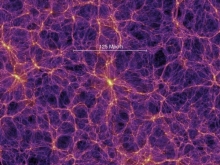Penn Researchers Weigh Cosmic Voids

Cosmologists have established that much of the stuff of the universe is made of dark matter, a mysterious, invisible substance not directly detectable but which exerts a gravitational pull on surrounding objects. Dark matter is thought to exist in a vast network of filaments throughout the universe, pulling luminous galaxies into an interconnected web of clusters, interspersed with seemingly empty voids.
Researchers at the University of Pennsylvania have measured the "weight" of these cosmic voids and filaments for the first time, showing the former are not as empty as they look. The investigations were conducted by graduate student Joseph Clampitt and Bhuvnesh Jain, Professor and Edmund J. and Louise W. Kahn Term Chair in the Natural Sciences in the Department of Physics and Astronomy.
While galaxies and filaments have more mass than the average regions of the universe, voids have less mass than average. This unbalanced distribution causes matter to rapidly move away from voids and towards the concentrations of mass along the cosmic filaments that lie between them. Clampitt and Jain detected the tiny distortions produced by voids—known as gravitational lensing—on the images of nearly 40 million galaxies in the Sloan Digital Sky Survey. Theoretical studies had predicted that they should have had to wait for much bigger surveys well into the future to detect void lensing, but their analysis techniques, using a new way of processing the images of galaxies, extracted a subtle signal no one had seen before.
The research was supported by the U.S. Department of Energy and National Science Foundation.





